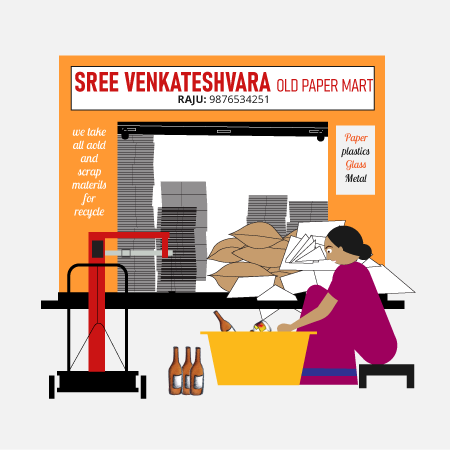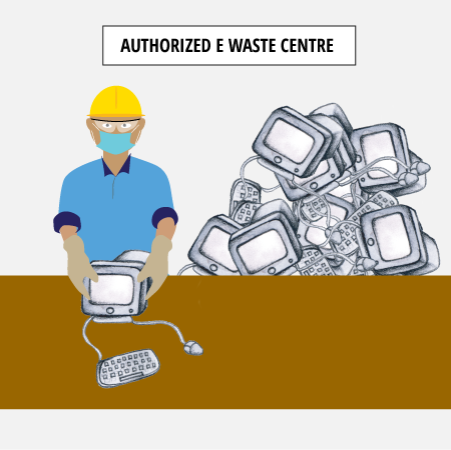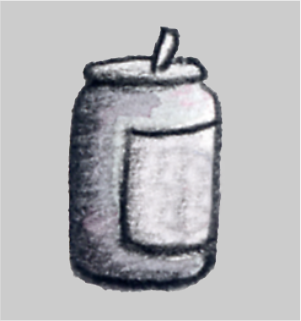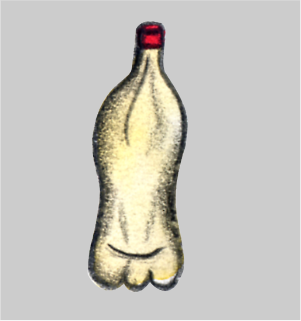Shades of Recycling
For recycling to happen well in a city, we need to segregate at source and reach the materials to the right aggregator (kabbadiwalla). The aggregator will further segregate the material and send to the right recycler. Within each category, there are high value, low value and non-recyclable materials. It is important for us to understand this. Value is often driven by local market conditions.
Paper

Plastic

Glass
Who will recycle my stuff?
-
Your local kabadiwala

The Kabadiwala may not take everything - he knows what is more valuable for him.
-
NGO / Agency / government run centre

A shop will probably take more types of waste as they have space to aggregate.
-
An authorized vendor

Dispose e-waste & medical waste through authorized centre’s only.
Does it really get recycled?
India's recycling system is largely built on its informal workers.
They have created recovery channels that run like a well-oiled machine!
What is my Return on Investment
if I recycle?
If we are even a slightly intelligent species, we should not be asking this question! It’s not about money. Alright, yes, you can make back some money from recycling but the bigger returns are not so tangible or immediate. It’s about saving natural capital.
Percentages indicate energy savings from recycling vs. making from raw materials.
-

40% energy saved
Recycling just one sheet can power a cell phone for 6 hours.
Creating one ton of recycled paper uses 40% less energy than creating one ton of virgin paper.
-

95% energy saved
Every aluminium can recycled saves enough energy to watch a full movie!
Using recycled scraps to make aluminium cans uses 95% less energy than making cans from raw materials.
-

90% energy saved
Every plastic bottle recycled, saves energy to power a 60 watt bulb for 6 hours.
Recycling plastic requires only 10% of the energy needed to create new plastic from scratch.
-

74% energy saved
Every glass bottle recycled saves enough energy to listen to 73 hours of music.
It requires 75% less energy to recycle glass than to create it from new materials and glass is 100% recyclable.

What about other materials?
You may have some items that you don’t need anymore but are still in good condition. Toys, clothes, books and even some appliances may fall into this category. Here are some ideas for what to do with them:• Give it to charity - find an orphanage, old age home or someone in need who could use it.
• Sell it online through social media and swapping sites.
• Barter (swap) the item with a friend. Host a swap day with friends and family where you exchange old stuff.
• Bring back the ‘hand me down’ culture :)
Just think of all the simple ways we used in the past to make sure things were used to the fullest. All this abundance of choice is an illusion at the cost of nature, our health and eventually our quality of life.
FAQs about Recycling
Answer
Man made materials have not evolved to the state where they can all become nutrients and go back to natural systems. So there will always be residual materials that need to be landfilled or incinerated.
Answer
The amount of energy saved through recycling depends upon the material being recycled. Some, such as aluminum, save a great deal, while others may not save any.
Answer
Recycling materials avoids the pollution that would be generated through sending large volumes of waste to landfills and for incineration. It also reduces the environmental burden of virgin material extraction and manufacturing processes.
Answer
Since our MSW is largely organic bio-degradable waste - 60 % can be recycled into compost, and another 30% can be recycled into new raw materials, sending only 10% to landfill. So technically we can recycle upto 90%.
Answer
Yes, it will help save a lot on fuel and green house emissions if the waste is recovered as close as possible to the generation of waste. It will also sustain the jobs of many people who work in the waste collection, processing and recycling sector. In a growing city, jobs are hard to come by for the migrants and this sector often provides the means of survival and entrepreneurship.
Answer
One study shows that sustainable development policies cannot rely primarily on recycling, even though it is an important component.
These policies should primarily aim at reducing the consumption of each non renewable raw matérial so that the annual growth rate of consumption remains under 1%.
And in any case, to be efficient is the indispensable second part of these policies, recycling should be developed to much higher rates than the ones observed for most recycled materials in the world today.
(The interesting thing is that India recycles 60% of all our plastic which is the highest in the world, but we do not reduce the rate of increase of production and consumption of virgin plastic)
Answer
We need to reduce our consumption of many materials so we curtail rate of depletion and redesign materials that can go back to nature without any pollution or ill-effects.
Studies indicate that the sustainable packaging market is growing much faster than the overall packaging industry in the OECD, and is expected to double in size from $88 million in 2009 to $170 billion in 2014.
Answer
Recycling is not a common behaviour. And yet, we need to grow the numbers of people worldwide who will recycle seriously.
Recent studies have concluded that social pressure is unviable in this context. One reason for this is that social pressure functions well in small group sizes of 50 to 150 individuals (common to nomadic hunter-gatherer peoples) but not in communities numbering in the millions, as we see today.
Another reason is that individual recycling does not take place in the public view. In a study done by social psychologist Shawn Burn, it was found that personal contact with individuals within a neighborhood is the most effective way to increase recycling within a community. In his study, he had 10 block leaders talk to their neighbors and convince them to recycle. A comparison group was sent fliers promoting recycling.
It was found that the neighbors that were personally contacted by their block leaders recycled much more than the group without personal contact. As a result of this study, Shawn Burn believes that personal contact within a small group of people is an important factor in encouraging recycling. Another study done by Stuart Oskamp examines the effect of neighbors and friends on recycling. It was found in his studies that people who had friends and neighbors that recycled were much more likely to also recycle than those who didn’t have friends and neighbors that recycled.
Answer
Unscrupulous waste trade became a serious concern in the 1980s due to three converging factors: increasing amounts of hazardous waste; inadequate processing plants; and stricter regulations in the developed world with growing environmental awareness. Managing special waste streams properly became expensive, apparently too costly for some. Filthy shipments started travelling round the world. Toxic waste causes long-term poisoning of soil and water, affecting people's health and living conditions, sometimes irreversibly. It mainly involves slow processes that must be monitored for years to be detected and proven (let alone remedied).
In 1994, a unique coalition of developing countries, and some from Eastern and Western Europe along with Greenpeace, managed to pass by consensus what has come to be known as the Basel Ban. The Basel Ban decision effectively banned as of 1 January 1998, all forms of hazardous waste exports from the 29 wealthiest most industrialized countries of the Organization of Economic Cooperation and Development (OECD) to all non-OECD countries.
Fighting against illegal waste trade also requires harmonised environmental laws and the backing of an international jurisdiction, regardless of which territories or nationalities may be involved.
All the investigations confirm that hazardous waste trafficking is booming. It is mainly the work of existing criminal organisations, using the same Channels and methods as for other "goods", such as drugs, arms and people. They sometimes hide behind a legal front in the waste treatment industry.
The prime victims are developing countries and conflict zones (trafficking of all sorts thrives on social disorder).
In Italy an estimated 30% of the special waste processing business is thought to be owned by "ecomafia" outfits, winning contracts quite legally and "taking care" of waste by dumping it on the Campania Region farmlands or in the Mediterranean, in Italy and abroad (mainly in Africa).
Legambiente, an Italian environmental NGO, estimates that eco-crime in Italy involves 202 organised groups, with €.4 thousand million revenue in 2005. Though profit is the main incentive, the limited risks are also attractive.
Environmental offences are not a priority and police pressure is consequently lower.
Answer
Decide that it is important to do recycling inspite of being very busy!
Know the various categories of waste.
Separate waste at home, keep different containers for organic/recyclable/rejects and hazardous.
Store cleaned and dry recyclable waste.
Give this to a local kabbadiwalla - and he will send it for recycling. Store toxic and hazardous waste, and once in three months, drive to the nearest agency that collects and safely disposes this for you.
Compost your organic waste at home or in your community
There is also another advantage of separating recyclable materials at the earliest possible stage – the recyclables themselves are less contaminated by other materials in the waste, and so need less cleaning and have a higher value.
If the wastes are less contaminated, the work involved in sorting them is less hazardous and unpleasant. This simple act helps the people whose everyday work is sorting mounds of mixed waste.
Answer
You can begin by writing to them and asking them to take more responsibility for their packaging. All the packaging you see at Nayandahalli (an informal sector recycling area in Bangalore city) is actually is used by large companies who keep making choices to use newer materials which may be more toxic or difficult to recycle.
Metalised poly is one such material that is difficult to recycle.
Large corporations could support some of the industries here to help them do a more efficient job and in under safer conditions. This act could be shared with their customers so that they can be perceived as a conscious green company.
Packaging by MNCs forms 13% of the price of retail processed food in India.
If you work in a large corporation, put pressure on them to begin recycling efforts in the office. Become a champion, remember that one person recycles only if they know someone who also recycles.






















